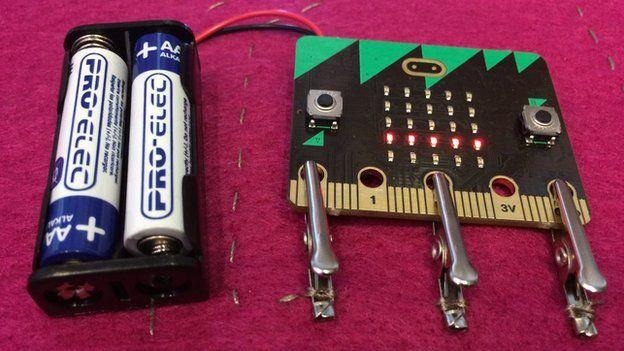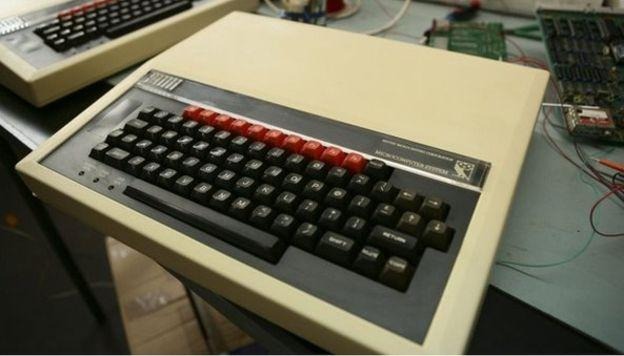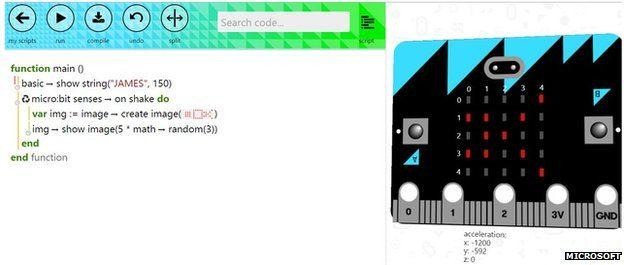BBC Micro:bit Explained In 5 Steps
The BBC collaborates with 29 partners to send thousands of miniature computers to every grade 7 child in the UK. This is the BBC you're thinking of – the news organization – and this is not the first time they've done such a project. Micro:bit is aimed at educating the public and setting a creative fire under the feet of the UK's youth. To do this, the micro:bit pocket-sized computer is being distributed for free to students, complete with programmable innards, Bluetooth, built-in compass, and motion detection. This is all part of the BBC's 2015 Make it Digital initiative.
1. If kids can paint, they can program
Why is the BBC handing computers to children across the nation? Sinead Rocks, Head of BBC Learning, explains it like so: "we happily give children paint brushes when they're young, with no experience – it should be exactly the same with technology."

Rocks goes on, "The BBC micro:bit is all about young people learning to express themselves digitally, and it's their device to own. ...And as the micro:bit is able to connect to everything from mobile phones to plant pots and Raspberry Pis, this could be for the internet-of-things what the BBC Micro was to the British gaming industry."
2. This isn't the BBC's first go at computers for the public
The BBC Micro was the BBC's original Computer Literacy Project machine. This machine was available to the public much in the same way the micro:bit is here in 2015, and required that you plug it in to a television monitor to function. It was huge.

It was also far less powerful than the super tiny computers we're able to manufacture today. The micro:bit is more powerful than the original Micro by a magnitude of 18x according to the BBC's report.
3. Creating the "BBC micro:bit" miniature programmable computer
The micro:bit is being made much smaller than the original "Micro", and it's far more self-contained. It has a set of LED lights* as a super-simple display and is designed to be small enough to fit in your pocket at just 4cm by 5cm (1.6in by 2in).

*This machine contains an array of 25 red LEDs "to light up, flash messages, create games and invent digital stories" according to the BBC's original listing.
You'll also find Five Input and Output (I/O) rings able to connect to devices or sensors. These rings connect using crocodile clips or 4mm banana plugs.
To the right and left of the LED array you'll find two programmable buttons. Simple on-off, yes-no, 1 or 0 sorts of buttons.
4. Partners collaborate to create the micro:bit with the BBC
The BBC isn't fronting all the cash themselves. Instead they're running the show while they call upon a number of partners to help in their own uniquely suited ways.
• ARM – providing mbed hardware, software development kits and compiler services
• Barclays – supporting overall product delivery and outreach activities
• element14 – sourcing components and managing the manufacturing
• Freescale – supplying the sensors and USB controllers
• Lancaster University – created and wrote the micro:bit runtime
• Microsoft – providing the TouchDevelop web-based programming tools and hosting service as well as teacher training materials

• Nordic Semiconductor – supplying the main processor and enabled Bluetooth Smart
• Samsung – connecting the BBC micro:bit to phones and tablets, and developing the Android app
• ScienceScope – distributing to schools and developing the iOS App
• Technology Will Save Us – designed the shape, look and feel of the device
• The Wellcome Trust – Providing learning opportunities for teachers and schools
5. Distribution to the youth of the UK
This device will be distributed inside the year 2015. The BBC suggests that the "micro:bit initiative aims to make a huge impact in 2015 with the BBC and its partners committed to providing up to one million micro:bits before the end of the year."
In the near future, the BBC plans to make the technical specifications for the device open sourced. They also suggest that the partnership between the BBC and hardware partners plan on developing a non-profit (not-for-profit, as it's called in the UK) company to "oversee and drive the micro:bit legacy."
Year 7 youngsters across the UK will be able to attain their micro:bit through their local school or direct through the BBC. We'll know more about distribution in the near future.
